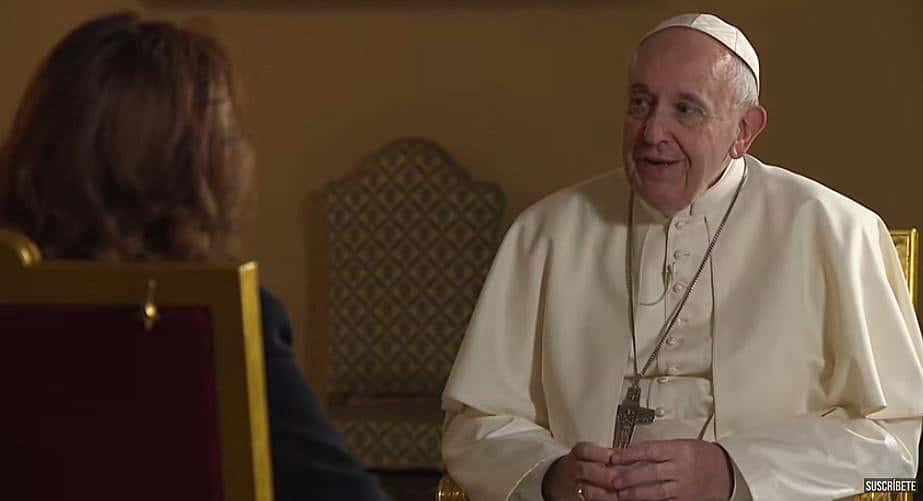Pope Francis, once again, has made headlines with another informal quotation. This time it is about homosexual couples and civil unions. His remarks have caused confusion and dismay on one end of the pew, and overwhelming delight and high hopes on the other. As with previous comments, the problem is not so much what Francis stated, but rather how the news media has presented and interpreted his statement. Before we make any quick judgments, we should take a look at what Francis actually said and the contexts and intentions of his words.
It would help to see what Francis originally said in Spanish:
“Una persona homosexual tiene derecho de estar en la familia. Son hijos de Dios y tienen derecho de [estar en] una familia. No se puede echar de la familia a nadie, ni hacerle la vida imposible por eso. Lo que tenemos que hacer es una ley de convivencia civil. Tienen derecho a estar cubiertos legalmente. Yo defendí eso!”
Which translates into English as:
“A homosexual person has the right to be in the family. They are children of God and they have the right to a family. You cannot throw anybody out of a family or make someone’s life impossible for this [reason]. What we have to do is make a law about civil unions. They have the right to be covered legally. I defended this!”
It should be noted that “convivencia civil,” does not simply mean “civil coexistence” or “civil conviviality” as other Catholic sources are trying to claim. Rather, Francis indeed meant “civil union.” In many Spanish-speaking cultures, the term “unión civil” is used, but in Argentina the legal term for civil unions is “convivencia civil.”
First, these comments do not constitute a declaration of official teaching ex cathedra by Pope Francis, nor is it a statement out of nowhere, in opposition to prior teaching as the media is spinning it to be. This is instead a continued expression of pastoral care. It is one that continues to echo what previous popes have stated in the past, though perhaps not in such a bold way as this pope has: namely, that persons of the LGBTQ community have human dignity and should be treated as persons, not as subhumans.
Second, there remains a question of the original context of his words. There is an abrupt change of topic in his quotation, from talking about respecting the place of an LGBTQ person within a family to talking about protection under the law. The change of topic might not follow Pope Francis’s original thought as the source and editing of the clip has been called into question. There is a missing link here, one that can provide clearer context to what Francis means.
Regardless of what exactly Francis said, it seems that every article, whether in English or Spanish, has followed the same format. First, each article begins with a juicy exposition of the quote from the documentary Francesco. Then, there is an expression of surprise that this is the first time any pope has made such a statement. Next, a faulty interpretation of his words is offered, followed by some historical background with cherry-picked quotes from the 2003 document from the Congregation of the Doctrine of the Faith (CDF) regarding the legal recognition of homosexual unions. And finally, to add context that can actually enlighten Francis’s words, a passing reference is made to his time as Archbishop of Buenos Aires when he advocated for civil unions instead of marriage laws.
This sensationalization distorts the pastoral import of Pope Francis: he cares for all his flock (especially those who suffer, like homosexual persons who are excluded from their families). And essential to this care is a fidelity to the truth of marriage. As such, he sees civil union laws as prudent for two very pastoral reasons. On the one hand, he seeks the protection under the law of LGBTQ persons who have for a long time been ostracized. On the other hand, while granting that legal protection, he does not seek to compromise the definition of marriage as the Church recognizes it. This was his original intention as Archbishop when he encouraged his fellow bishops to advocate for civil unions when the Argentine government was going to be passing a law regarding homosexual marriage despite Church teaching.
In other words, Francis’s support for a civil union law was not something out of the blue and against Church teaching. Instead, he was speaking from and into a particular government context. If governments will be passing laws about non-heterosexual relationships anyway, they may as well be encouraged to do so in a manner that still preserves the rights of the Church in that state.
Outside of the United States, there are Church and sociopolitical realities in which LGBTQ persons are not only being discriminated against but are directly persecuted. At this point, the law needs to intervene to protect their human dignity. Furthermore, many countries have yet to decide on the issue of legal recognition of homosexual couples.
Pope Francis has been very clear about upholding Church teaching. At the same time, he has been very clear about giving pastoral care to the LGBTQ community, which is incidentally what the CDF document of 2003 encouraged pastors to do.1 What has been overlooked is that many in the Church have failed to uphold the dignity of LGBTQ persons and have allowed them to be demonized, in the truest sense of the word.
Ultimately, Francis in his statement is not going against or changing Church teaching, as the news media is sensationalizing. Rather he continues to give an example of a pastor, towing the line of pastoral care and doctrinal fidelity. Instead of obsessing over the words “civil union,” perhaps we should hone in on the phrase that nobody in the media is talking about: “Son hijos de Dios!” (“They are children of God!”)
- Quoting the Catechism of the Catholic Church, the document says “according to the teaching of the Church, men and women with homosexual tendencies ‘must be accepted with respect, compassion and sensitivity. Every sign of unjust discrimination in their regard should be avoided’.” ↩


